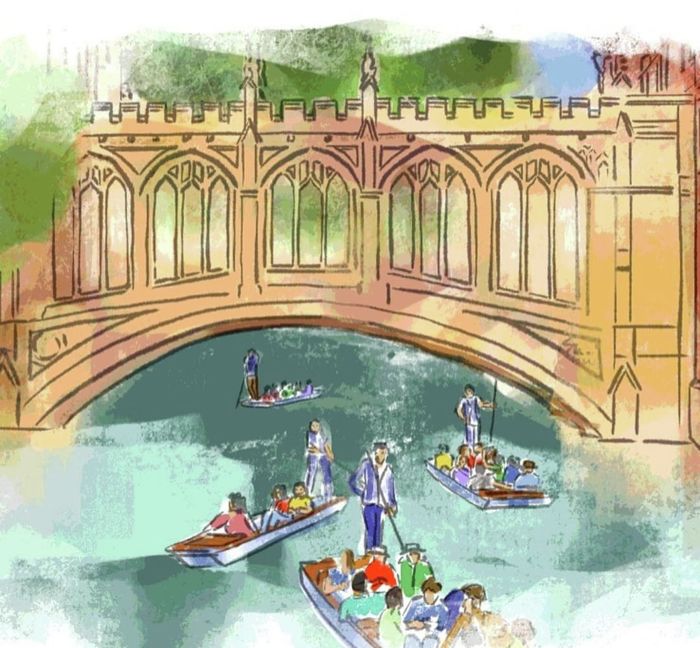What’s the deal with Cambridge tradition?
Scarlet Rowe explores her conflicted relationship with Cambridge tradition, asking herself whether she loves it or loathes it.

I’m still not sure what to think about Cambridge tradition. Part of this is because, like all second years, I’ve only really spent two terms experiencing it.
The first part of Cambridge tradition that we all come across is ‘matriculation’. I remember first stumbling across the bizarre word just as I entered the land of Cambridge, wondering what on earth it entails. I soon found out that it is basically a photo opportunity, with the end product being a framed photo for your parents (and it also, less importantly, makes you a shiny, new and official member of the university community).
Part and parcel of matriculation is gown-wearing. Wearing a gown is fun precisely because it is so novel. I think a lot of us are half drawn to Cambridge because of the infamous and romanticised images of students in gowns gliding down the streets, probably talking about something clever (though if you’re anything like me, you’ll probably just be thinking about dinner or something). So when I wear a gown, it is a little like I am playing a game of make-believe whereby for one minute I feel like an important person doing important things. Gowns are heavy with symbolism of a mysterious world of academics who operate on a different plane from everyone else. Even though the symbolism is obviously mythical, it nevertheless captures people’s imaginations.
“It’s a bit absurd to read Latin to a room of people who don’t know what you’re talking about, but come to think of it, it’s not that different from supervisions in that sense.”
Matriculation is usually followed by a formal (though I understand that this year things have been a bit different). Formals tend to begin with a Latin prayer. I have no clue what is said in Latin, and find it all relatively entertaining, but I appreciate that some people see it as a symbol of elitism which needs to be rooted out. Latin is understood by few people, and tends to be heavily associated with private schooling. It’s also a bit absurd to read Latin to a room of people who on the whole don’t know what you’re talking about (but, come to think of it, it’s not that different from supervisions in that sense).
Beyond Latin, the culture of being served and not having to lift a finger in formals does make me a little uncomfortable. It’s not normal to sit down and have everything sorted out for you, and it shouldn’t be made normal either. Of course, we do have a choice whether to go to formals in the first place, so the inevitable argument is that if they make you uncomfortable, don’t go. I suppose there’s also a danger in over-interpreting everything, especially when formals are mostly meant as a bit of fun. However, formals should not actively alienate people. And if speaking in Latin or wearing a gown or being served doesn’t make you feel right, then there’s perhaps a discussion to be had with your JCR or friends about how to approach this. I wish I had the answers for you.
“When I wear my gown, I feel like a wizard who just so happens to study HSPS at Caius.”
I must admit that I quite like gowns, myself, not that I ever seem to wear mine. I feel like a wizard who just so happens to study HSPS at Caius. And then when the gown goes off, I am back to being Scarlet. Alas. But that’s just the thing with gowns: they are really such a tiny part of the Cambridge experience, and that’s what makes them special. If we wore them everyday, I’d probably become disenchanted with them quite quickly.
Tradition definitely makes sense in Cambridge, a town filled with immaculately preserved historic buildings. Sometimes when I’m there, it is almost possible to pretend I am in a different time zone altogether . So when I see people walking in gowns, I don’t really react, because I have somehow become used to it. It half feels as though rejecting tradition in Cambridge is a bit of a crime, because the whole place literally screams tradition. But I am sure you’re not alone if you are uncomfortable around tradition, and luckily, newer colleges like Churchill agree with you. Applying to Caius means that I’m stuck with the Latin, at least for the foreseeable future.
However, Cambridge tradition doesn’t need to be hundreds of years old. For example, going to Cindies seems to be an established part of the Cambridge experience (I doubt Cindies has been around for the past 600 years or so). Calling things ridiculous names which kind of fit (?) like ‘gyp’ and ‘plodge’ is also quite quintessentially Cambridge. I always cringe when I say ‘gyp’ in a non-university context,because it just, quite frankly, sounds ludicrous. I don’t know why ‘kitchen’ isn’t sufficient, but then again ‘kitchen’ might be a bit generous for a cupboard with a microwave, a kettle and a hob (if you’re lucky). In other news, I wonder what the etymology of gyp is?
So, all in all I have quite a mixed approach to Cambridge tradition (no surprises there). As with any tradition, some of it is nice, and some of it is questionable. So whether you love or loathe it, I’m sure you’ll find many friends on either side of the coin.
 News / Caius mourns its tree-mendous loss23 December 2025
News / Caius mourns its tree-mendous loss23 December 2025 News / Clare Hall spent over £500k opposing busway 24 December 2025
News / Clare Hall spent over £500k opposing busway 24 December 2025 Comment / The ‘class’ of Cambridge24 December 2025
Comment / The ‘class’ of Cambridge24 December 2025 Interviews / Politics, your own way: Tilly Middlehurst on speaking out21 December 2025
Interviews / Politics, your own way: Tilly Middlehurst on speaking out21 December 2025 Comment / Yes, I’m brown – but I have more important things to say22 December 2025
Comment / Yes, I’m brown – but I have more important things to say22 December 2025








